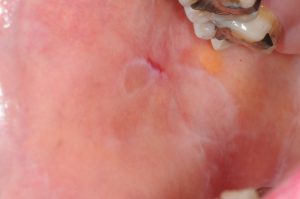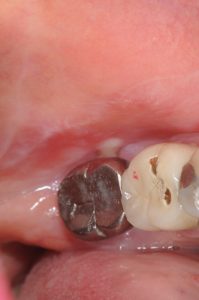| Oral Lichen Planus |
|
There are many types of oral lesions that can cause mouth soreness or discomfort. When patients experience such lesions or mouth sores that suddenly appear, a thorough evaluation by an oral surgeon is recommended for close monitoring or biopsy as indicated for definitive diagnosis. One such common lesion is Lichen Planus, a disease that can affect the skin and any mucosal lining such as oral, esophageal, vaginal mucosa as well as the skin. It may occur in all age groups. However, women over the age 50 years are most commonly affected. The cause of lichen planus is unknown, but genetics and immunity may play a factor. One suggested mechanism is the reaction of the body to an antigen (i. e. an allergic type reaction) on the surface of the skin or mucosa as in an autoimmune disorder leading to the appearance of the lesions. Lichen planus can occur in the mouth in several different patterns. The reticular pattern is commonly found on the cheeks as lacy web-like, white threads that are slightly raised. These lines are sometimes referred to as Wickham’s Striae. The erosive (atrophic) pattern can affect any mucosal surface, including the cheeks, tongue, and gums and appears bright red due to the loss of the top layer of the mucosa. Patients report significant discomfort when eating and drinking, particularly with extremes of temperature, acidic, coarse, or spicy foods. In severe cases, ulceration can develop resulting in pain even when not eating or drinking. Another variation is Lichenoid reactions which resemble lichen planus both clinically and microscopically but are often due to an allergic response from medications, oral hygiene products and occasionally, metallic filling materials. Treatment considerations: Often the reticular form of oral lichen planus does not require any treatment. The erosive and ulcerative forms can usually be controlled with the use of topical corticosteroids. In some cases, systemic steroids or other medicines may be prescribed. Unfortunately, there is no known cure. Dr. H. Ryan Kazemi is a board-certified oral and maxillofacial surgeon in Bethesda, MD |

